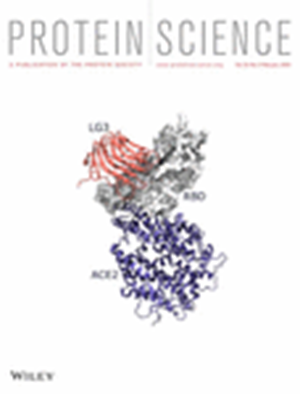Peptides inhibiting the assembly of monomeric human l‐lactate dehydrogenase into catalytically active homotetramer decrease the synthesis of lactate in cultured cells
IF 4.5
3区 生物学
Q1 BIOCHEMISTRY & MOLECULAR BIOLOGY
引用次数: 0
Abstract
The energetic metabolism of cancer cells relies on a substantial commitment of pyruvate to the catalytic action of lactate‐generating dehydrogenases. This coupling mainly depends on lactate dehydrogenase A (LDH‐A), which is overexpressed in different types of cancers, and therefore represents an appealing therapeutic target. Taking into account that the activity of LDHs is exclusively exerted by their tetrameric forms, it was recently shown that peptides perturbing the monomers‐to‐tetramer assembly inhibit human LDH‐A (hLDH‐A). However, to identify these peptides, tetrameric hLDH‐A was transiently exposed to strongly acidic conditions inducing its dissociation into monomers, which were tested as a target for peptides at low pH. Nevertheless, the availability of native monomeric hLDH‐A would allow performing similar screenings under physiological conditions. Here we report on the unprecedented isolation of recombinant monomeric hLDH‐A at neutral pH, and on its use to identify peptides inhibiting the assembly of the tetrameric enzyme. Remarkably, the GQNGISDL octapeptide, mimicking the 296–303 portion of hLDH‐A C‐terminal region, was observed to effectively inhibit the target enzyme. Moreover, by dissecting the action of this octapeptide, the cGQND cyclic tetrapeptide was found to act as the parental compound. Furthermore, we performed assays using MCF7 and BxPC3 cultured cells, exclusively expressing hLDH‐A and hLDH‐B, respectively. By means of these assays we detected a selective action of linear and cyclic GQND tetrapeptides, inhibiting lactate secretion in MCF7 cells only. Overall, our observations suggest that peptides mimicking the C‐terminal region of hLDH‐A effectively interfere with protein–protein interactions responsible for the assembly of the tetrameric enzyme.抑制单体人乳酸脱氢酶组装成具有催化活性的同源四聚体的多肽可减少培养细胞中乳酸的合成
癌细胞的能量代谢依赖于丙酮酸对乳酸生成脱氢酶催化作用的大量投入。这种耦合主要依赖于乳酸脱氢酶 A(LDH-A),它在不同类型的癌症中过度表达,因此是一个具有吸引力的治疗靶点。考虑到乳酸脱氢酶的活性完全由其四聚体形式发挥,最近有研究表明,扰乱单体到四聚体组装的多肽能抑制人类乳酸脱氢酶 A(hLDH-A)。然而,为了鉴别这些肽,四聚体 hLDH-A 要瞬时暴露在强酸性条件下,诱导其解离成单体,在低 pH 值下作为肽的目标进行测试。不过,如果能获得原生单体 hLDH-A,就能在生理条件下进行类似的筛选。在此,我们报告了在中性pH条件下前所未有地分离重组单体hLDH-A的情况,以及利用重组单体hLDH-A鉴定抑制四聚体酶组装的多肽的情况。值得注意的是,模拟 hLDH-A C 端 296-303 部分的 GQNGISDL 八肽能有效抑制目标酶。此外,通过剖析这种八肽的作用,我们发现 cGQND 环状四肽可作为亲代化合物发挥作用。此外,我们还使用 MCF7 和 BxPC3 培养细胞(分别专门表达 hLDH-A 和 hLDH-B)进行了检测。通过这些试验,我们检测到线性和环状 GQND 四肽具有选择性作用,只抑制 MCF7 细胞的乳酸盐分泌。总之,我们的观察结果表明,模仿 hLDH-A C 端区域的多肽能有效干扰负责组装四聚体酶的蛋白质间相互作用。
本文章由计算机程序翻译,如有差异,请以英文原文为准。
求助全文
约1分钟内获得全文
求助全文
来源期刊

Protein Science
生物-生化与分子生物学
CiteScore
12.40
自引率
1.20%
发文量
246
审稿时长
1 months
期刊介绍:
Protein Science, the flagship journal of The Protein Society, is a publication that focuses on advancing fundamental knowledge in the field of protein molecules. The journal welcomes original reports and review articles that contribute to our understanding of protein function, structure, folding, design, and evolution.
Additionally, Protein Science encourages papers that explore the applications of protein science in various areas such as therapeutics, protein-based biomaterials, bionanotechnology, synthetic biology, and bioelectronics.
The journal accepts manuscript submissions in any suitable format for review, with the requirement of converting the manuscript to journal-style format only upon acceptance for publication.
Protein Science is indexed and abstracted in numerous databases, including the Agricultural & Environmental Science Database (ProQuest), Biological Science Database (ProQuest), CAS: Chemical Abstracts Service (ACS), Embase (Elsevier), Health & Medical Collection (ProQuest), Health Research Premium Collection (ProQuest), Materials Science & Engineering Database (ProQuest), MEDLINE/PubMed (NLM), Natural Science Collection (ProQuest), and SciTech Premium Collection (ProQuest).
 求助内容:
求助内容: 应助结果提醒方式:
应助结果提醒方式:


